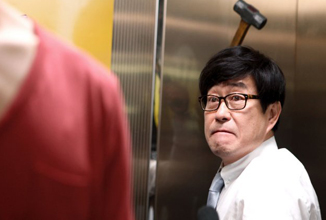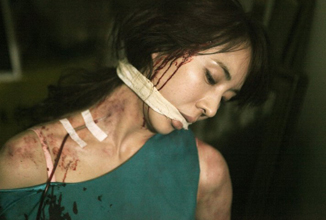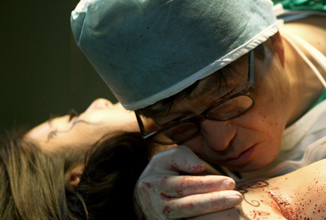 |
Synopsis:
Choi In-beom (Kim Chang-wan) is a plastic surgeon married to the beautiful Soon-jeong (Bae Soo-eun); a marriage wholly encouraged by Soon-jeong's mother that came as a direct result of extensive cosmetic surgery carried out on the young woman by the titular doctor.
However, increasingly In-beom is becoming violently controlling and viciously jealous - his growing mental imbalance exacerbated by copious drug use - and when his (seemingly paranoid) spying on Soon-jeong reveals that she is indeed having an affair with a much younger man, he loses what little semblance of reason he has remaining; determining to destroy his wife, her lover and her family all the while searching for the next beautiful girl to surgically enhance to take Soon-jeong's place...
Review:
During the New Korean Cinema wave of the late nineties and early noughties, a number of Korean horror films - 'A Tale of Two Sisters', the 'Ghost School' series, 'The Fox with Nine Tails'; the list goes on - succeeded in not only raising the bar against which horror movies would be measured for years to come but also repeatedly proved beyond a shadow of a doubt that the Korean horror genre was as worthy a platform for insightful, multilayered narratives as any. However, in recent years Korean horror has somewhat struggled to equal the quality of those now considered 'classic' films and while there have from time to time been examples that bode well for the future popularity of the genre ('Bedevilled'; 'Death Bell'; last year's 'Killer Toon'; and even to a degree Kim Seong-hong's previous film 'Missing', in spite of what some might describe as misogynistic undertones), the vast majority of horror films appearing ('White: Melody of the Curse'; 'The Cat'; etc etc etc) have been rather generic, predictable and frankly both uninspiring and uninspired.
With the aforementioned 'Missing' having appeared to point to Kim Seong-hong as a director with a talent for realising visceral narratives in almost shocking but nonetheless gripping form, I for one was hopeful that 'Doctor' would further build his reputation within the horror genre. Sadly, though 'Doctor' is indeed notable it is so for largely the wrong reasons:
Behind the opening credits of 'Doctor', classical music accompanies a sumptuous and evocative (flashback) montage scene showing In-beom artistically marking out numerous areas on Soon-jeong's body in preparation for the extended plastic surgery procedures he is about to undertake - her naked curves traversed and framed in a manner that brings to mind a camera panning a landscape vista - and while it could be well be said that repeated full-frame focusing on Soon-jeong's breasts, and even more so her nipples, is unnecessarily salacious and even gratuitous for the sake of it these adult-oriented visuals serve to fit that landscape analogy, nonetheless; emphasising the fact that this is an unashamedly sexually-charged narrative from a director unafraid of being provocative who almost demands comment and reaction.
However, it is only a matter of minutes from the conclusion of this introduction and the beginning of present day live action scenes before the failings of 'Doctor' start to show:
 |
 |
Our first proper introduction to the main characters comes as In-beom gets ready to leave his marital home for work. As he puts on the tie that Soon-jeong has left out for him, he comments on her beauty but no sooner does she gently dismiss his statement with an embarrassed smile than he flies into an abusive rage, accusing her of sneering and showing the 'vulgar' person she used to be. The first half of this scene works perfectly to show In-beom's unbalanced, on-the-edge nature and it does have to be said that the sheer menace of his vitriolic rant - as well as the (apparent) fear of Soon-jeong - is palpable but rather than taking a 'less is more' approach director Kim Seong-hong pushes the concept too far and for too long; In-beom's tirade (complete with stamping foot, wailing and hands on hips) quickly becoming more like the tantrum of a petulant child than the controlling psychological abuse intended, in the process appearing as almost laughably unbelievable.
The subsequent small segment of In-beom apologising for his behaviour and creepily caressing Soon-jeong's arm - while she grips her dress in abhorrence - does its best to redress the balance but frankly first impressions count and to my mind they resolutely remain.
As far as the characters of Soon-jeong and her mother are concerned, any initial sympathy and viewer empathy initially created for them as individuals, for their situation or indeed what ultimately befalls them is largely and quickly destroyed on it becoming clear that the marriage was simply a means for each of them to selflessly gain, in a worldly sense; Soon-jeong getting the extensive cosmetic surgery she wanted and her mother securing a large house, a car and the end of her money worries. Ok, so the idea of self-serving, less than pure individuals falling victim to a deranged, psychotic killer has been used to great effect in many films over the years and if it had been handled slightly differently here it could have opened up the possibility of repeatedly twisting viewer emotions, but with the majority of the main characters of ‘Doctor’ (on both protagonist and victim sides) being so underdeveloped, overtly self-obsessed and frankly unlikeable, I actually found myself increasingly physically ‘trying’ to care.
Compared to Kim Seong-hong’s previous film ‘Missing’, in which all of the victims were noticeably and completely innocent, Doctor’s ongoing premise is far less shocking - and as a direct consequence less interesting - and I can’t help but wonder if reactions to the torture of innocents in ‘Missing’ at the time of its release were somewhat behind the director’s narrative take in this case.
 |
 |
Even with regard to the character of In-beom, whose history and background are vital to the story’s ultimate outcome, director Kim Seong-hong chooses to hold back the very information that would give his character much needed depth; instead opting for an expositional ‘reveal’ towards the film’s (initial) conclusion. As many of you will no doubt be aware, expositional monologues are rather a pet hate of mine - more often than not appearing as simply lazy, from a narrative realisation point of view - and that very monologue of explanation draws attention to yet more flaws in the fact that for the vast majority of the running time this vital information explaining the true cause his psychological problems is replaced with numerous possibilities (insane jealousy, drug use, etc); each clearly being part of the issue but equally as obviously not the entire story. As such, viewers will be all too aware that they aren’t being told the whole story, deliberately, and while Kim Seong-hong likely wanted the “reveal” to come either wholly as a surprise or to give viewers the opportunity to try to work out the full state of play, In-beom’s choosing of a replacement for Soon-jeong (and what he undertakes once she is chosen) largely gives the game away, well in advance.
The final conclusion of the story acts as a second ‘surprise’ but while it may not be predictable, per se - at least in the lead up to it - nonetheless it serves only to feel like over-trodden territory, in hindsight.
By far and away the strongest elements of ‘Doctor’ are the visceral, blood-soaked murders themselves (apart from one laughably ludicrous incident where In-beom intravenously connects Soon-jeong to a flower) and while that may be a fairly obvious statement to make in relation to a horror film, to my mind that very fact is the reason the genre has largely fallen in popularity in recent years. Those seeking out horror fare are likely fully au fait with the plethora of earlier examples of bloody death on screen within gripping narratives (many often now considered to be classics for exactly that reason) to the extent that brutality for brutality’s sake is no longer enough to make a film worthwhile, on its own. We may over the years have become somewhat desensitised to graphically detailed torture, death and the actions of disturbed characters determined to cause pain but we haven’t in the process lost the need for intelligent, well thought out storylines. In fact, our need for the latter may now be greater than ever.
Cast:
Kim Chang-wan, Bae Soo-eun, Seo Geon-woo, Han Da-eun
Directed by:
Kim Seong-hong
Summary:
With 'Missing' having appeared to point to Kim Seong-hong as a director with a talent for realising visceral narratives in almost shocking but nonetheless gripping form, I for one was hopeful that 'Doctor' would further build his reputation within the horror genre. Sadly, though 'Doctor' is indeed notable it is so for largely the wrong reasons.
|
All images © Mines Entertainment
Review © Paul Quinn
|
| |
|







